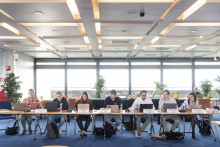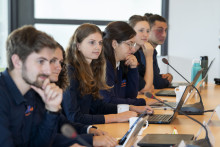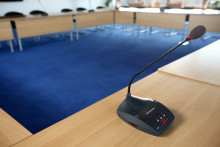It has been a week since the elections for both student and staff members for the University Council (UC) of the University of Twente. Just before the start of the elections, on the 15th of June, a column was posted on the diversity and effectivity of the UC elections. While blaming structural problems on diversity and inclusion is a simple thing to do, there seems to be a considerable lack of context awareness in this column.
One point which was mentioned was the turn-out rate of the elections. It is recognized that the turnout rate is dropping, but significant unmentioned influences to this number were unmentioned in the column. COVID has caused a tough two years for the entire world, including the UT society. Participation levels, connections to the UT and attendance rates to lectures and events are lower than before the pandemic. This is a problem which is also largely recognized by the UT. The UC has weekly discussion with the executive board, program directors and teaching staff on how to get students back to campus.
As the university council is a form of student participation, a lesser connection between the newer student generations and the UT campus will have its effects on the elections. Therefore, a decreasing turnout rate is a logical consequence, though stated that the participating student parties are doing their very best to get the attention among students. There is only so much two lists of 15 people each can do in five days of elections to activate and reach all students, and most difficult, the ones who do not come to campus.
Another point which was made was the diversity and inclusivity of the student members of the UC. In its beginnings, the UC is a democratically chosen group of representatives where each year new members of the UT-community are free to put their name and/or party on the voting ballot. This is a fair process where no-one and we repeat, no-one is restricted to put themselves up for election via one of the existing parties or with their own party. Both current active student parties, UReka and DAS, do their very best to gather the opinions of their own constituencies as best as possible. If students feel unrepresented and want to contribute to this, both the student parties UReka and DAS will happily give them a voice. There is no record of any type of exclusion from either party. As again can be seen this year as the student faction of the council will consist of an inclusive and diverse group of students! Of course, a percentage of electable students falls under the category of ‘white male and /or Dutch’, this does not mean that the UT student is wrongly represented within the UC. As the writer of the column himself studies at the UT and falls into that ‘’white and/or male’’ category, which means he also needs to be represented in the UC. Next to that, we would urge Ter Meer to have a good look at the people who are willing to represent students at the highest level of the University, the electable lists of UReka and DAS, and look if they really all fit within the stigma he describes.
The column also stated that mostly former board members are up for election. People with multiple backgrounds of experience, it being boards of study-/student-/sport- or culture associations, have and will participate in the council. For the ones that did a board year, they bring a lot of experience with student and educational affairs, knowledge on how the UT governance works and insight of the opinions of students. Therefore, we do not see why it is pointed out as a negative part of the electable people, to represent student voices within the UT, both parties are very happy to have people which such board experience on board for this said expertise, and they do a great job to helping the candidates without any board experience. Next to that, students without board experience are more than welcome to join the party lists, but practice shows that those students often just aren’t very interested.
As both UReka and DAS found the original column to be wrongly accusing and indirectly contributing to the problem, as the column only demotivates students more to not take part in student representation, we provide you with this written letter as response. We as student representatives are convinced that the University Council of the UT is a front runner in how student representation should be organised. Yes the turn-out dropped this year, but we still had one of the highest turn-outs in the Netherlands. Yes, there were multiple Dutch males on both lists, but over a third of the candidates were female and 10% of candidates were international students. These numbers are similar to the actual percentages within the student population of the UT. So please, let’s work together to get the campus up and running again after a tough two years, instead of pointing fingers and complaining without any solid arguments. Student participation is needed to check and act upon university policy and to make the campus a place for celebration and concentration, where everybody feels at home.
On behalf of University council parties UReka and DAS,
Jaime de Bruin Bram van Uden
University council member UReka University Council member DAS







